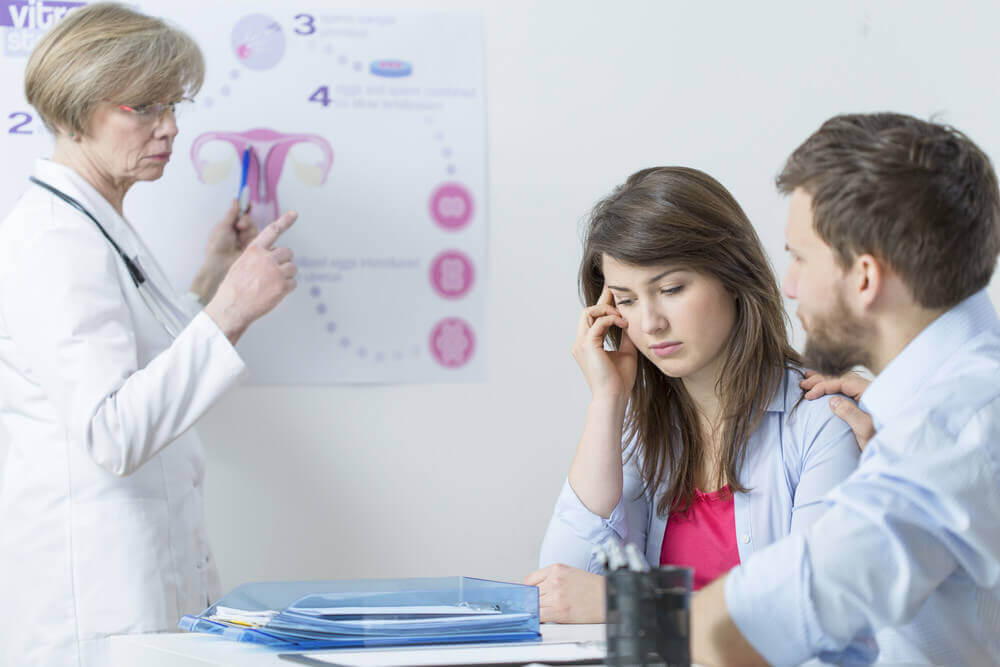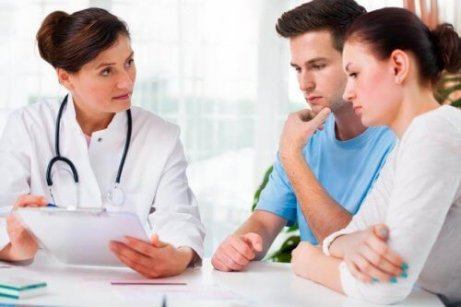Why Can't I Get Pregnant? 6 Possible Reasons

If you want to get pregnant but can’t, keep in mind it could be due to several factors. For example, things like diet, stress or other reproductive issues can make it difficult. Next, we’ll show you some of the most common causes.
Although it may seem easy to get pregnant, especially for couples surprised by unplanned pregnancies, conception is actually a very complex process.
If you had a successful pregnancy before, you may have difficulty getting pregnant again.
This can affect even the youngest, healthiest and most fertile women. This means they have little chance of conceiving successfully in each cycle.
Why can’t I get pregnant?
If you have a hard time getting pregnant, we recommend you try to stay calm and not get carried away by frustration. We know it’s not easy, but knowing how to deal with the situation is one of the most important things you can do.
There are many reasons why couples have problems having a baby. However, there’s not a single answer for all of them.
In these cases, it’s best to consult a doctor. Fortunately, most infertility problems can be identified and treated with an effective treatment.
Also, if you’ve been struggling to get pregnant, keep in mind the most common obstacles that you’ll face and what you can do to overcome them.
Causes for difficulties conceiving
These are some surprising causes that make it difficult for women to get pregnant.
1. Not enough exercise
The more exercise you do, the less body fat you have, which will make it easier to have a baby. However, in the same way, having too little body fat can make you have an irregular cycle.
Another important benefit of exercise is that you release endorphins which give you more energy. Without a doubt, by having more energy, you’re more likely to have sex more regularly. However, it’ll also mean that your body doesn’t have to work so hard to stay active.

Exercise also relieves stress. It’s likely that if you’ve been trying to have a baby for a while, you might feel angry, stressed and depressed. In that sense, exercise is important to put these negative feelings aside.
2. Unbalanced diet
To work in the best way, your body needs a balanced diet. This doesn’t mean eliminating all junk food or following a strict diet. However, make sure to eat everything in moderation and opt for healthy foods.
Certainly, if you want to get pregnant, you should make sure to get all the vitamins and minerals that you need. There are certain foods that really increase your fertility, such as fish and whole grains.
3. Not ovulating
Polycystic ovary syndrome, which can cause irregular menstrual cycles and an increase in male hormones, affects between 5 and 10% of women. In addition, it’s one of the most common reasons why they don’t ovulate.
Being overweight, obese or having thyroid problems can also affect ovulation.
“Fortunately, most infertility problems can be identified and treated with an effective treatment.”
4. Fallopian tube abnormalities
Women’s fallopian tubes can be blocked or damaged because of a previous ectopic pregnancy, surgery, or pelvic inflammatory disease. This damage can prevent sperm from reaching the egg.
In most cases, women don’t know they have problems with their fallopian tubes until they try to conceive. There are usually no symptoms.
5. Abnormal uterus
An abnormal uterus creates a greater chance of miscarriages. In addition, it also causes more risk of other complications during pregnancy and childbirth.
Because the uterus has an abnormal shape, the baby might be breeched or flipped. If this happens, the woman will be advised to have a cesarean section.
Also, if the uterus is smaller than normal, it’s possible for the baby to run out of space. This means that her water could break before she reaches full term, leading to premature birth. If the baby arrives early, he may need additional care.

6. Endometriosis
Endometriosis is a disorder where the tissue that normally lines the uterus, called the endometrium, grows out of the uterine cavity. It can attach itself to the outside of the uterus, ovaries, and fallopian tubes.
Certainly, the ovaries are responsible for releasing an egg every month. Then, the fallopian tubes transport the egg from the ovaries to the uterus.
When any of these organs are damaged, blocked or irritated by the endometrium, it can be harder to get pregnant. Age, health and severity of the condition will also affect the chances of conceiving a baby.
Finally, if you don’t get pregnant and are worried, we recommend making an appointment with your doctor.
As a general rule, most fertility specialists say that if you’re under 35, you should try for one year before seeking professional help. If you’re older, you should see a doctor after 6 months.
All cited sources were thoroughly reviewed by our team to ensure their quality, reliability, currency, and validity. The bibliography of this article was considered reliable and of academic or scientific accuracy.
-
Woelfer, B., Salim, R., Banerjee, S., Elson, J., Regan, L., & Jurkovic, D. (2001). Reproductive outcomes in women with congenital uterine anomalies detected by three-dimensional ultrasound screening. Obstetrics and Gynecology. https://doi.org/10.1016/S0029-7844(01)01599-X
-
Bulletti, C., Coccia, M. E., Battistoni, S., & Borini, A. (2010). Endometriosis and infertility. Journal of Assisted Reproduction and Genetics. https://doi.org/10.1080/00362177985380601
This text is provided for informational purposes only and does not replace consultation with a professional. If in doubt, consult your specialist.








